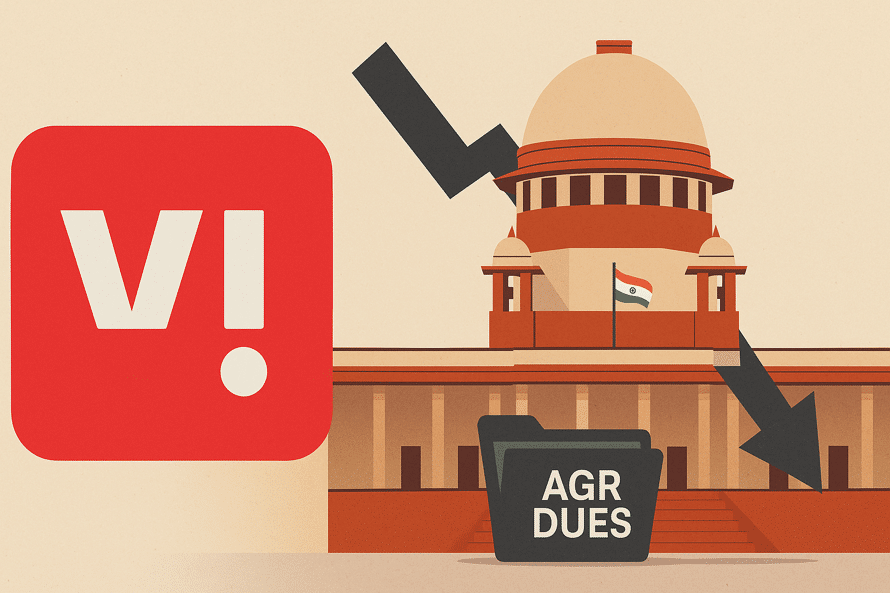Vodafone Idea vs Supreme Court: AGR Verdict, Fallout, and What It Means for Investors

Introduction: The Telecom Trouble Brewing Again
Vodafone Idea, one of India’s largest telecom players, is once again in the headlines—and not for good reasons. The Supreme Court recently dismissed the company’s plea for waiving interest and penalties related to its Adjusted Gross Revenue (AGR) dues. This legal setback has shaken investors, triggered stock price dips, and raised big questions about the company’s future.
In this blog, we’ll break down:
- What the AGR dispute is all about
- Why Vodafone Idea went to court again
- What the Supreme Court said
- And what all of this means for you, the retail investor
Let’s start with the basics.
What Is the AGR Dispute?
AGR, or Adjusted Gross Revenue, is the revenue figure telecom companies report to the government. Based on this, they pay license fees and spectrum charges. But there’s been a long-standing fight over what counts as revenue.
The Core Conflict:
- Telecom companies’ view: Only revenue from telecom services should count.
- Government’s view: All income, including from things like rent and investments, should be included.
This disagreement led to legal battles for over a decade. While telecom companies initially won in tribunals, the Supreme Court overturned those decisions in 2019. It backed the government’s broader definition, instantly increasing the liabilities of operators like Vodafone Idea.
Vodafone Idea’s Massive AGR Dues
After the 2019 verdict, telecom companies were hit with enormous bills. For Vodafone Idea, the AGR liability came out to a jaw-dropping ₹83,400 crore, of which:
| Component | Amount (₹ crore) |
|---|---|
| Principal Dues | 12,797 |
| Interest | 28,294 |
| Penalties | 6,012 |
| Interest on Penalties | 11,151 |
| Total Liability | 83,400 |
| Relief Sought | ~45,000 |
The company pleaded that most of this was due to compounding over the years—and asked the court to waive it.
Vodafone Idea’s Fresh Legal Plea: A Last-Ditch Effort?
Earlier this year, Vodafone Idea returned to the Supreme Court. This time, it didn’t challenge the AGR verdict itself, but asked for a waiver of:
- Interest
- Penalties
- Interest on penalties
Why?
Because the company is in deep financial distress. It generates only ₹9,200 crore annually, while the AGR repayment schedule demands around ₹18,000 crore per year.
It also argued:
- The government holds 49% equity in Vodafone Idea, post a dues-to-equity conversion.
- Letting the company fail would affect 200 million subscribers and 20,000+ jobs.
- This could lead to less competition in telecom—a public interest concern.
Supreme Court’s Response: A Firm “No”
The Supreme Court didn’t mince words. It:
- Called the plea “misconceived” and even “shocking”
- Emphasized that waivers are a policy matter, and fall under the government’s executive powers—not the judiciary
- Refused to intervene, while noting the government could still act if it wanted to
Why this matters:
The judiciary is reinforcing the principle of separation of powers. It won’t override its past decisions or act as a policymaker, even in critical economic situations.
How Did the Market React?
Not surprisingly, Vodafone Idea’s stock tanked:
- Dropped by over 12% in a single session
- Analysts and investors began raising red flags about the company’s viability
Why the panic?
Because this judgment shuts one of the few remaining doors of relief. And with the AGR moratorium ending in September 2025, Vodafone Idea will be under pressure to start full payments again.
Government’s Dilemma: Stakeholder or Enforcer?
The government previously rejected the company’s proposal to waive dues or restructure them. The concern? Setting a precedent that could be criticized by watchdogs like the CAG, or seen as favoritism.
Yet, it holds 49% stake in Vodafone Idea. If the company fails:
- That equity becomes worthless
- Millions of users will need to be shifted to other operators
- India’s telecom market could lose a major competitor
What Happens If Vodafone Idea Goes Insolvent?
This is not an exaggeration. The company has warned that without relief, it may approach the National Company Law Tribunal (NCLT). That would mean:
- Possible disruption in services
- Creditors fighting to recover dues
- Government losing investment
- Employees and vendors facing uncertainty
Can Vodafone Idea Survive Without Government Help?
It’s a tough road ahead. Here’s what the company can still try:
- Fresh equity infusion from investors
- Cost-cutting and operational efficiency
- Renewed talks with the government for a structured relief package
- Explore “other legal remedies” (as vaguely hinted by the Supreme Court)
Lessons for Investors: What Should You Do?
If you hold or are considering buying Vodafone Idea shares, this is a high-risk zone. Keep in mind:
- The stock is highly volatile
- The company is still under immense debt—over ₹2.14 lakh crore total
- Any relief depends on political will, not business performance
- If insolvency occurs, shareholders may get nothing
So unless you’re comfortable with speculative, high-risk investing, caution is advisable.
Conclusion: A Tipping Point for Telecom in India
The Vodafone Idea AGR verdict may seem like just another legal update—but it holds enormous implications. This is a classic case where law, business, and public policy intersect. As investors, understanding these developments helps us make informed choices.
The bigger picture? The Indian telecom sector needs to balance regulatory discipline with market stability. And Vodafone Idea’s future might just be the litmus test.
Quick Summary
- Vodafone Idea asked the Supreme Court to waive interest and penalties on its AGR dues
- Supreme Court dismissed the plea, saying waivers are a government matter
- Company’s financial condition remains critical; it may face insolvency
- Stock price dropped sharply, reflecting investor anxiety
- The government, with 49% stake, must weigh whether to intervene
FAQs
What is AGR in telecom?
AGR, or Adjusted Gross Revenue, is the income figure telecom companies report for paying government dues.
Why is Vodafone Idea in trouble again?
Because it owes over ₹83,000 crore in AGR dues and failed to get relief from the Supreme Court.
Will Vodafone Idea shut down?
The company has warned of possible insolvency if no help comes by 2026.
What does the Supreme Court’s verdict mean for investors?
It increases risk. Vodafone Idea’s future depends heavily on government support or capital infusion.
Why Did the Supreme Court Reject Vodafone Idea’s AGR Waiver Plea?
The court said the waiver decision is a policy matter, not a judicial one. It affirmed its 2019 ruling and maintained that only the executive (government) can grant such relief.
What Will Happen to Vodafone Idea Now?
Without relief, the company might run out of funds by FY2026. It could approach NCLT for insolvency, restructure debt, or attempt another equity raise.
Does the Government Have a Stake in Vodafone Idea?
Yes, after converting dues into equity in 2022, the Government of India owns 49% of Vodafone Idea.
Can Vodafone Idea Still Get Help from the Government?
Technically, yes. The Supreme Court left the door open for the government to step in. But there’s no confirmation that such help is coming.
Disclaimer
The stocks mentioned in this article are not recommendations. Please conduct your own research and due diligence before investing. Investment in securities market are subject to market risks, read all the related documents carefully before investing. Please read the Risk Disclosure documents carefully before investing in Equity Shares, Derivatives, Mutual fund, and/or other instruments traded on the Stock Exchanges. As investments are subject to market risks and price fluctuation risk, there is no assurance or guarantee that the investment objectives shall be achieved. Lemonn (Formerly known as NU Investors Technologies Pvt. Ltd) do not guarantee any assured returns on any investments. Past performance of securities/instruments is not indicative of their future performance.







